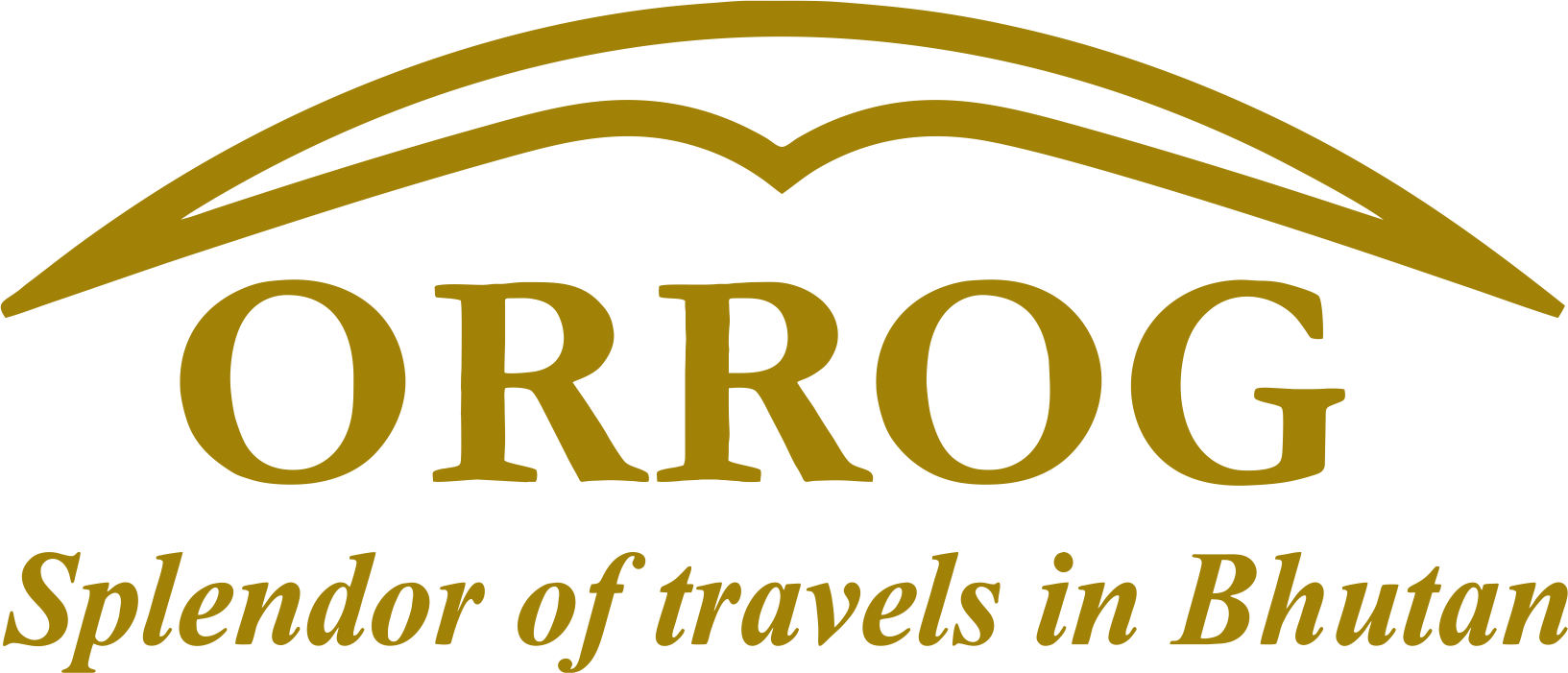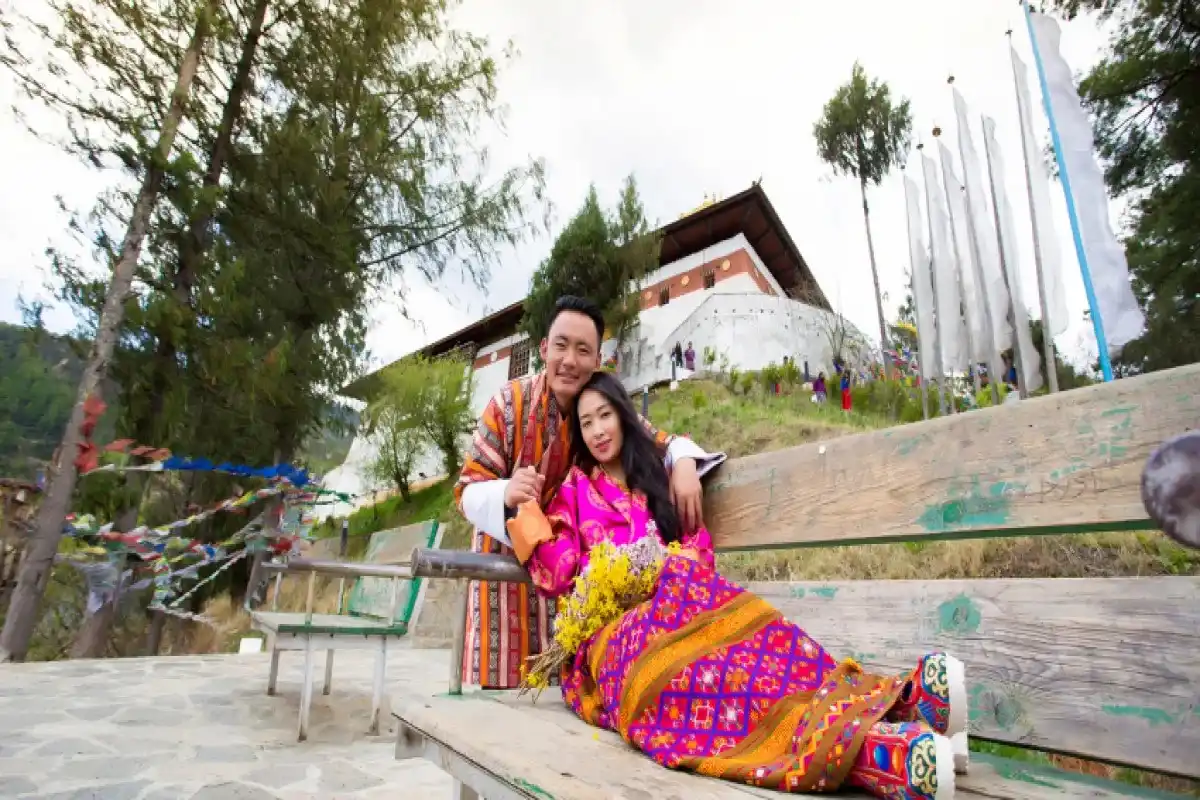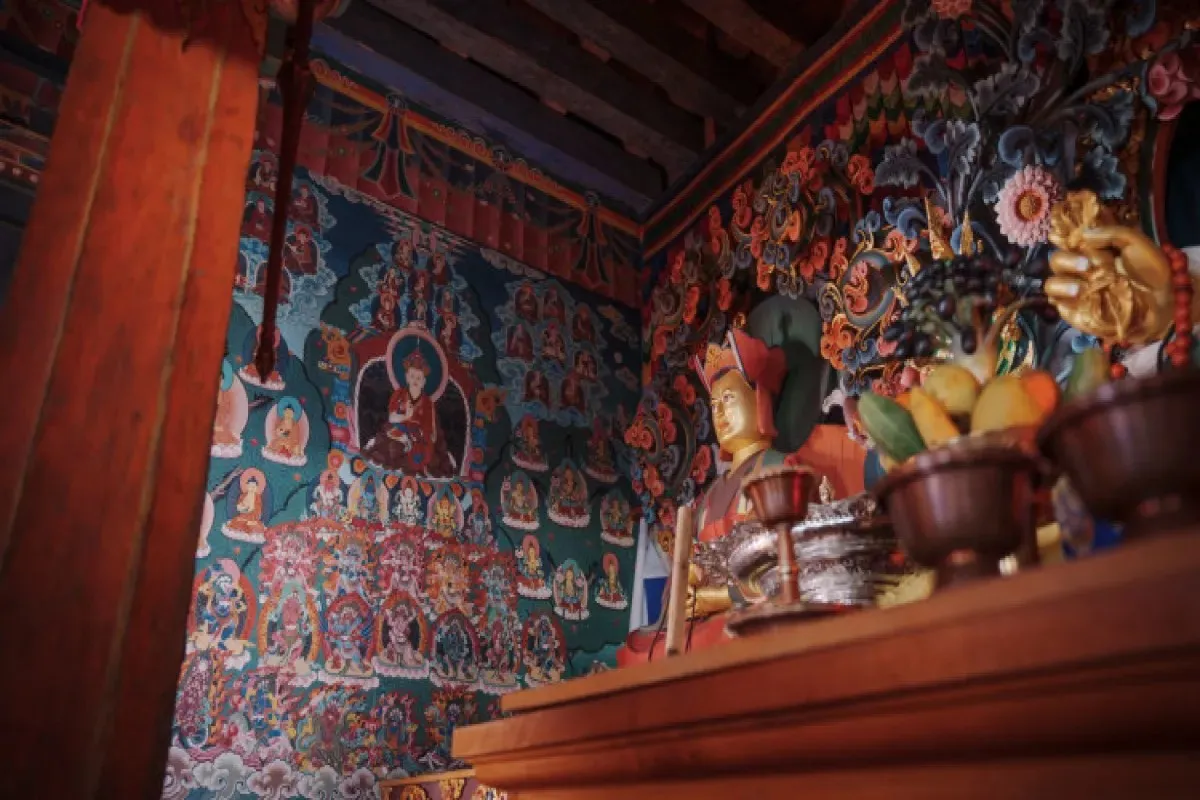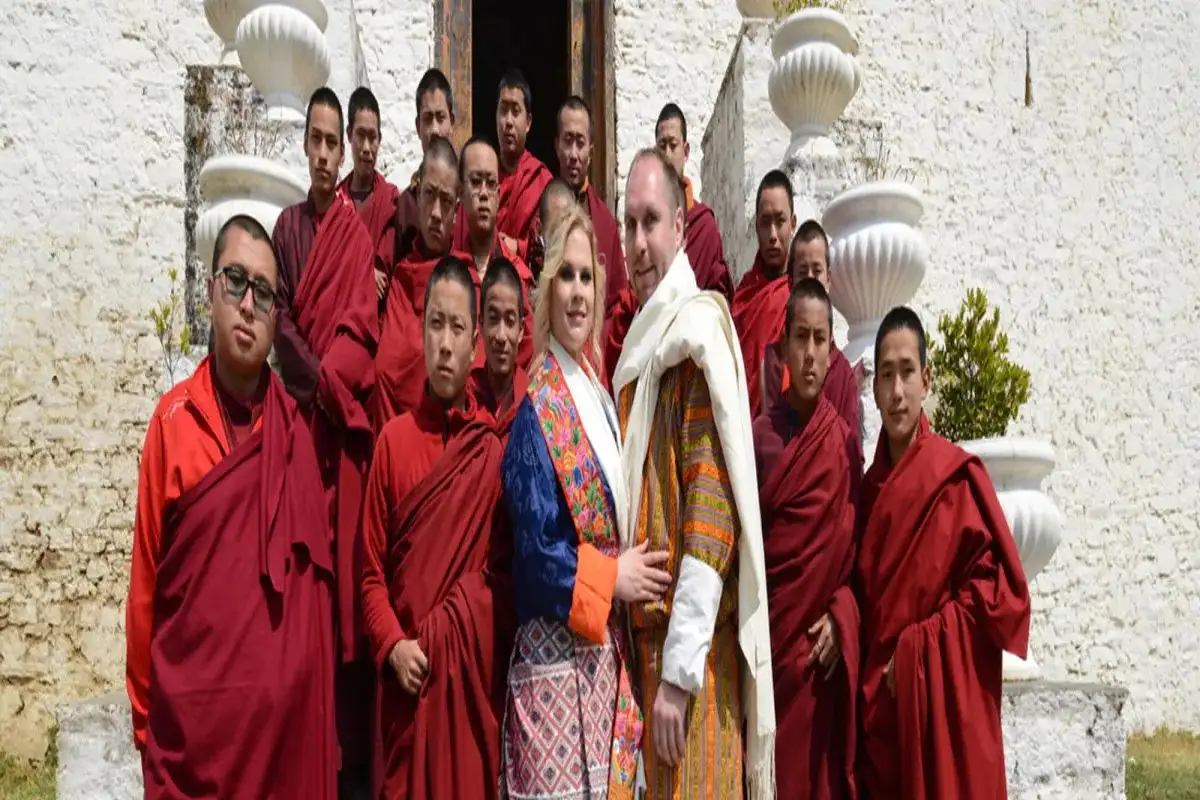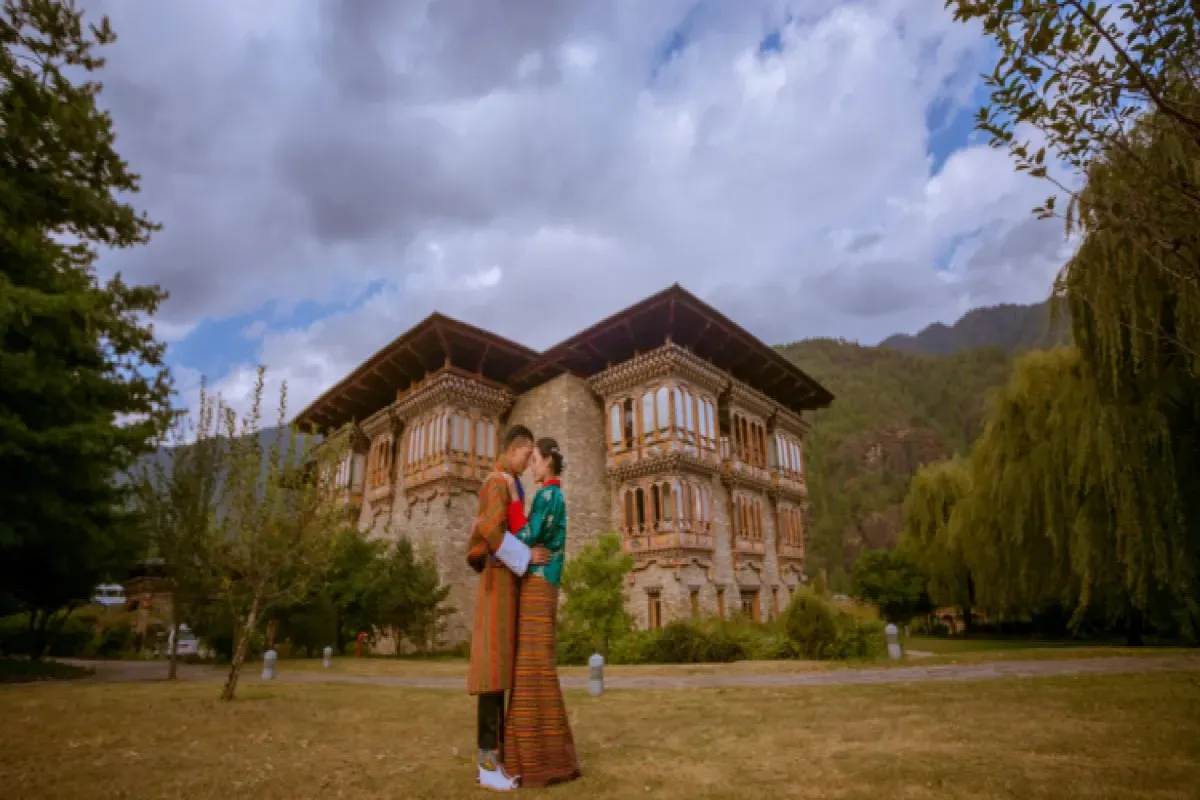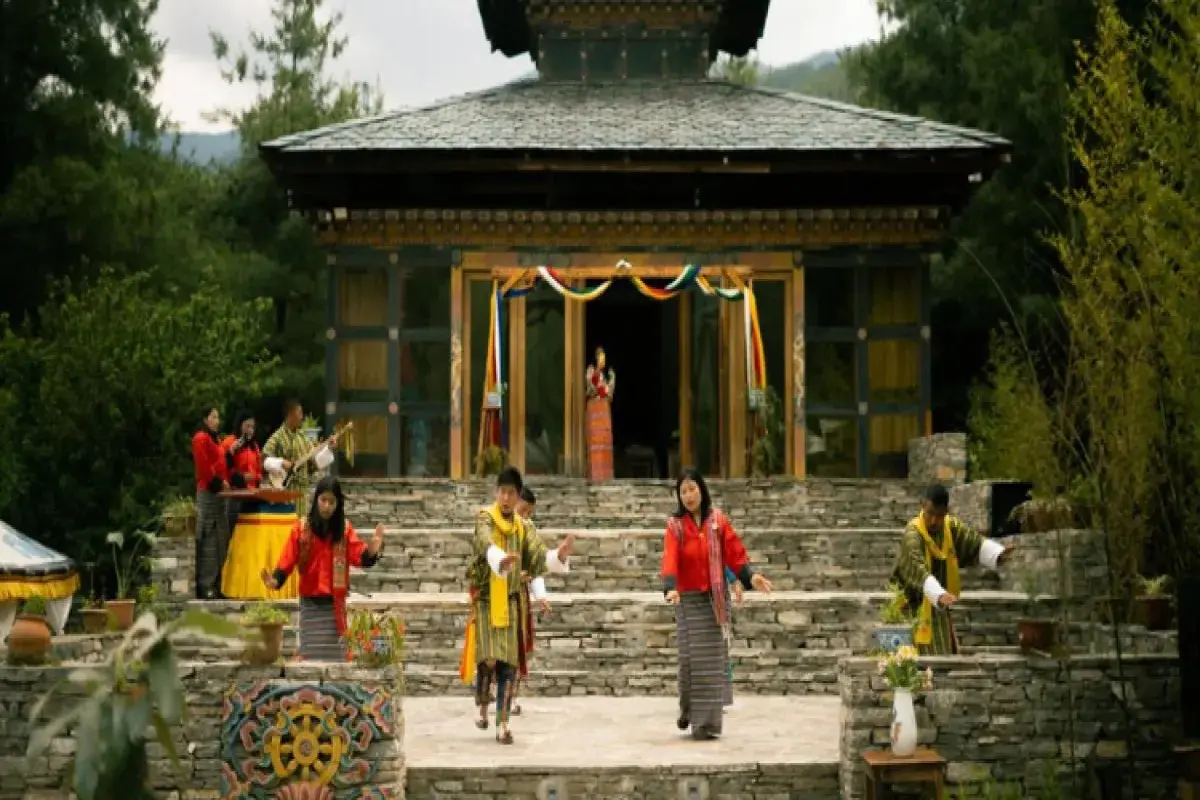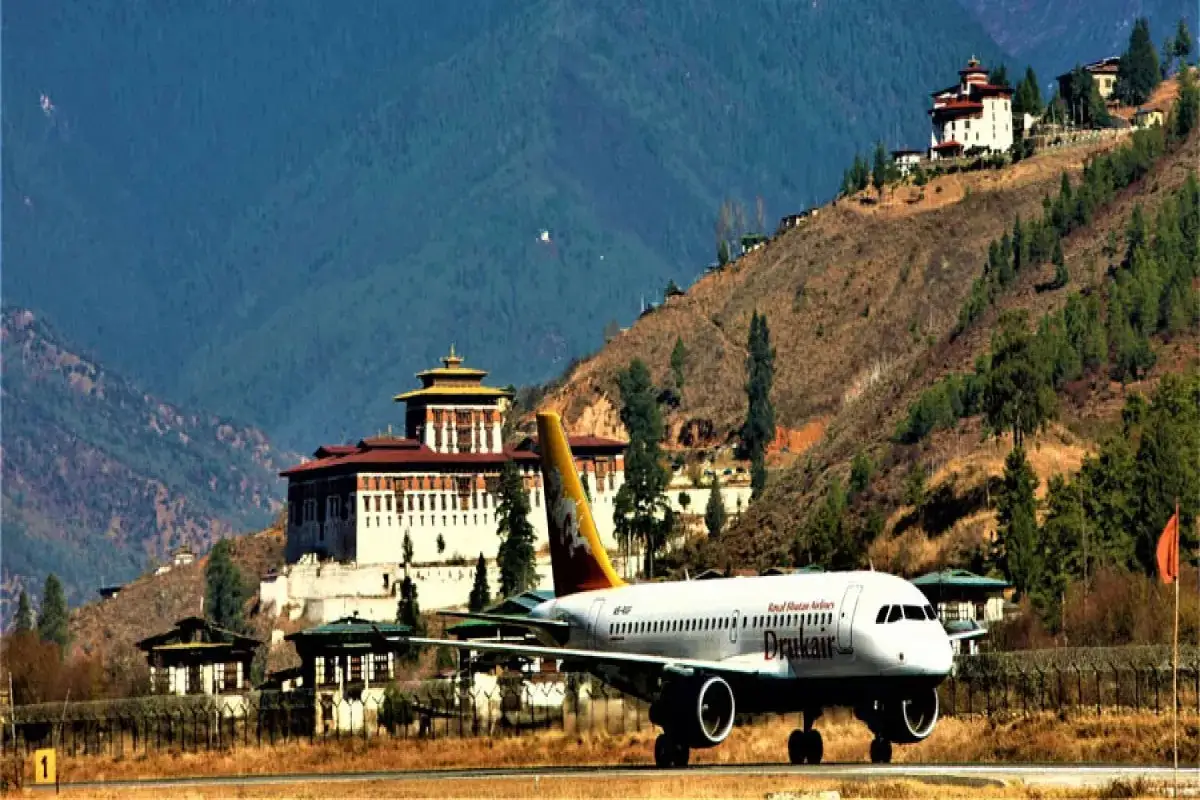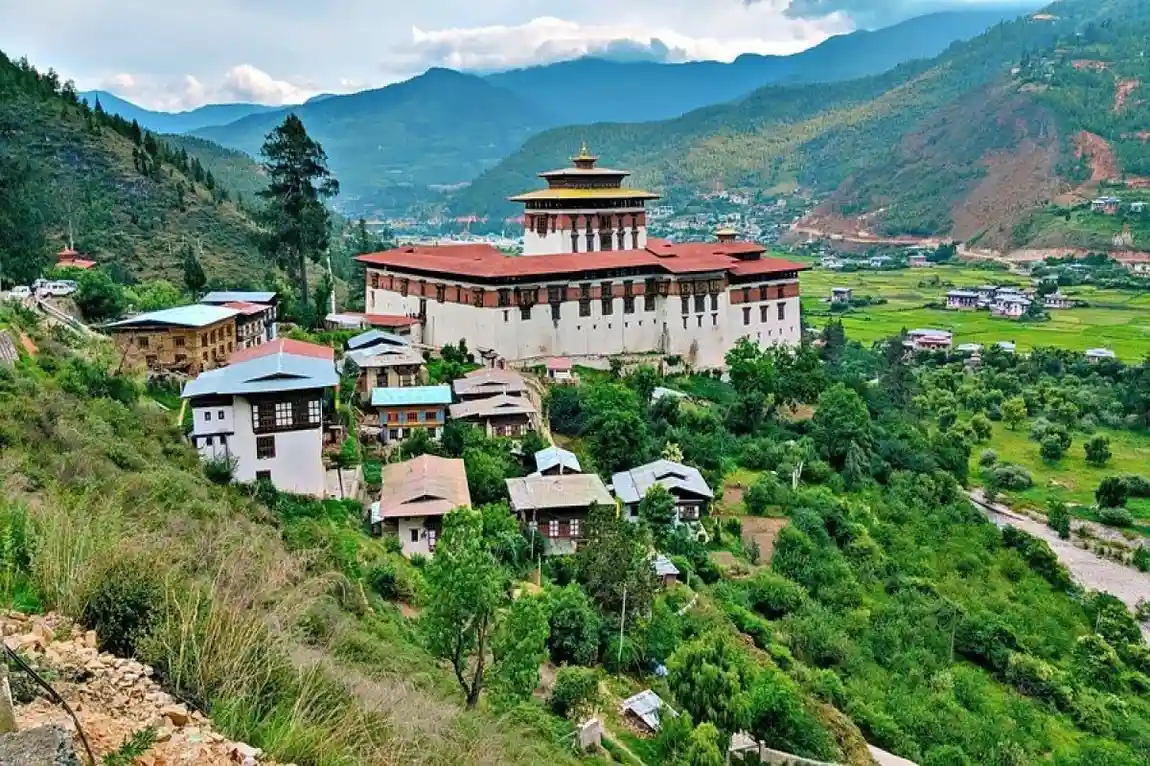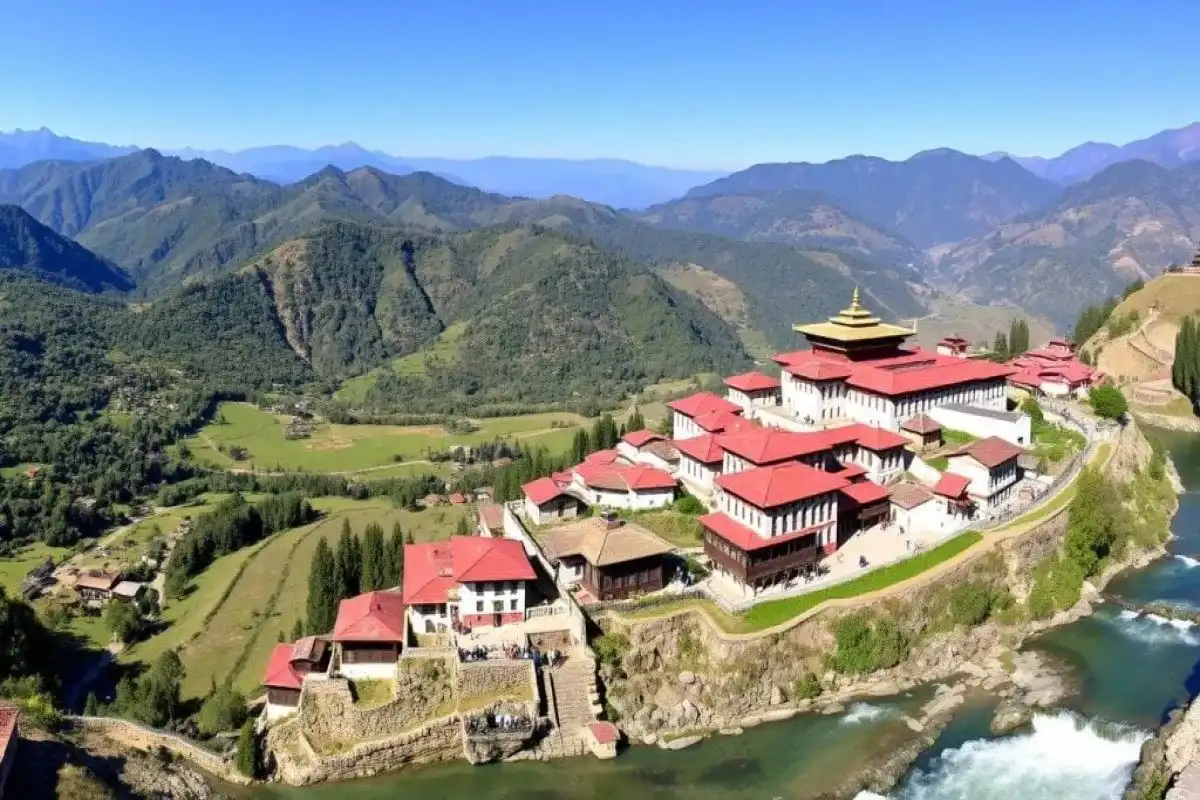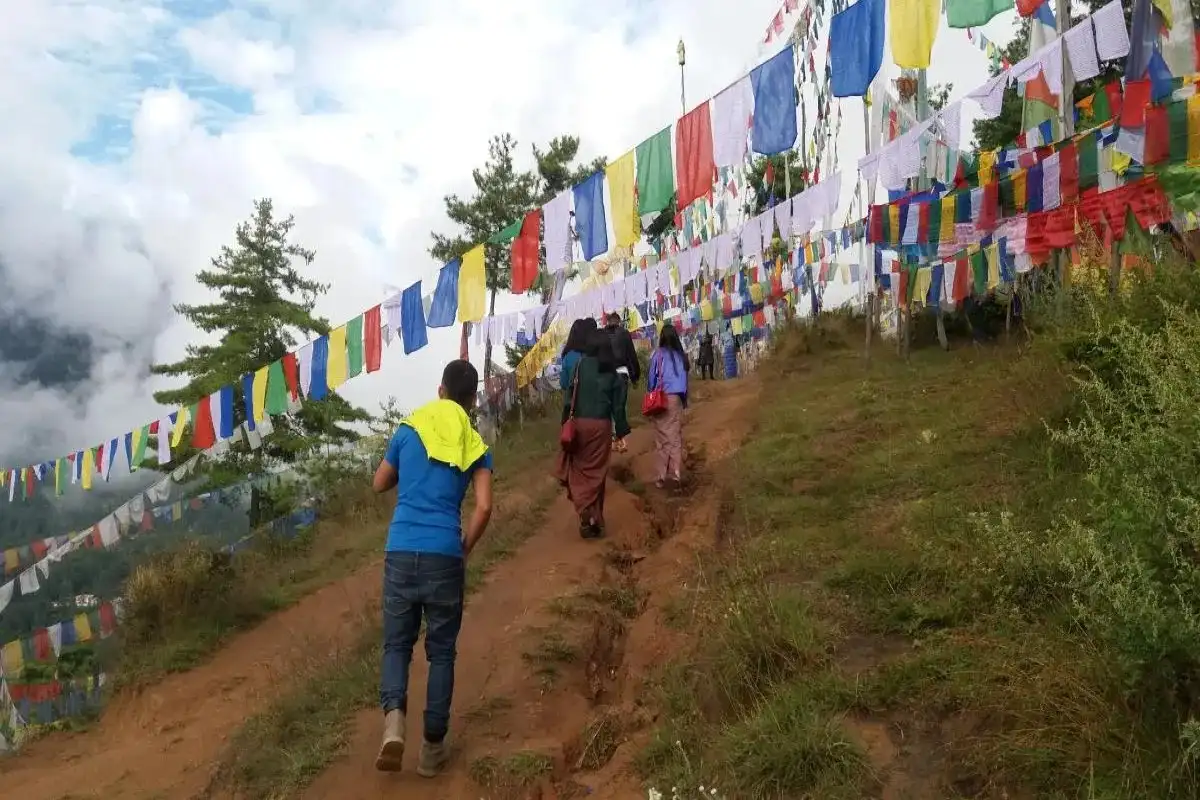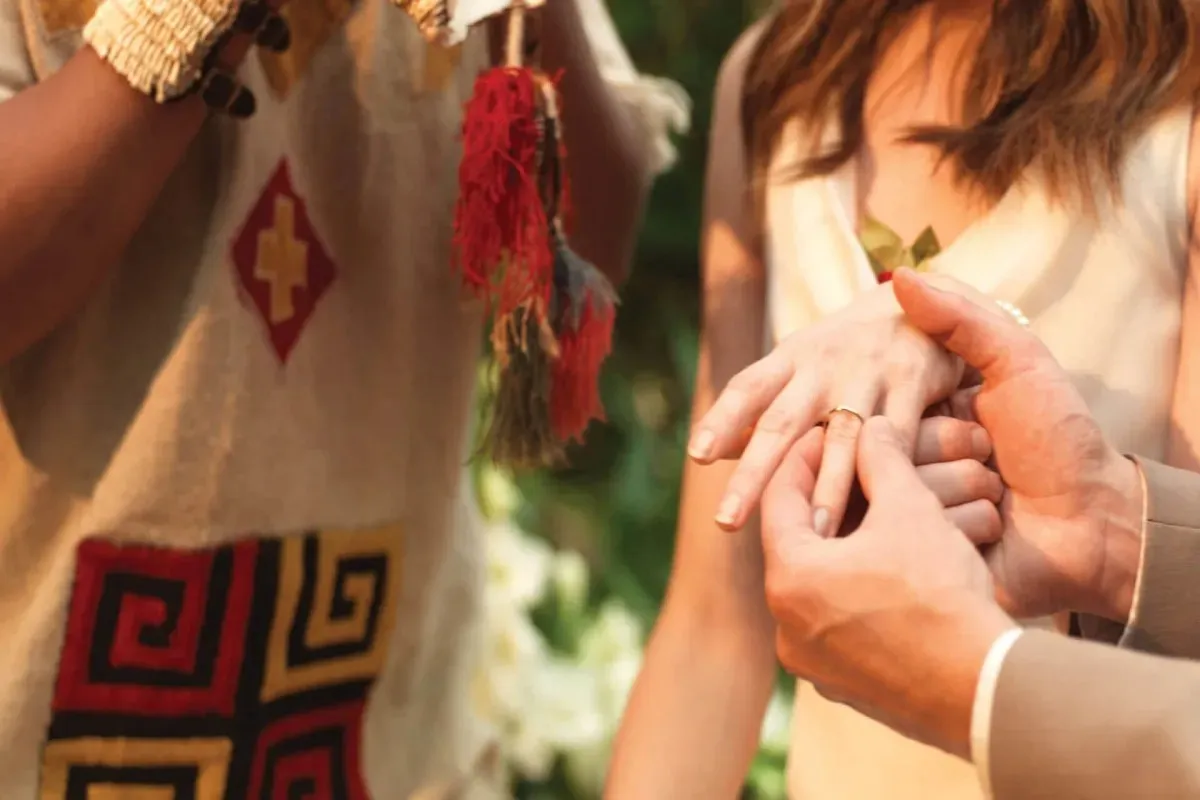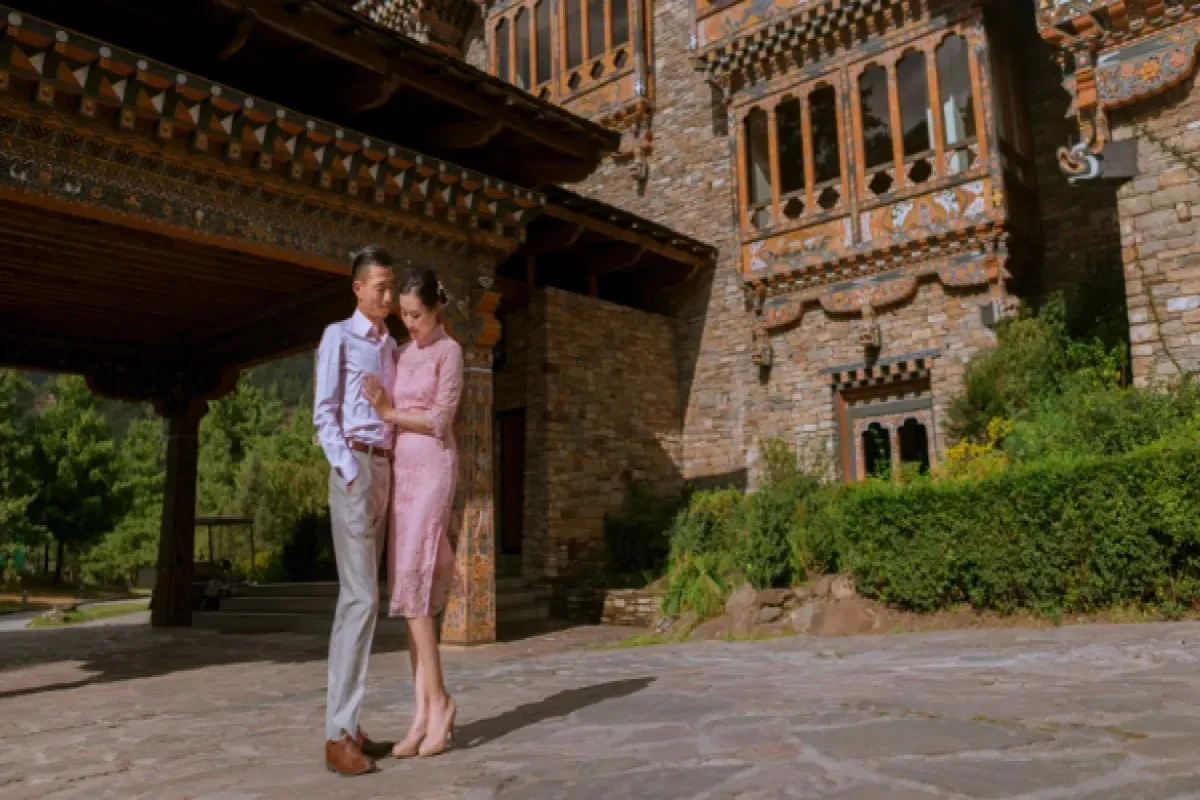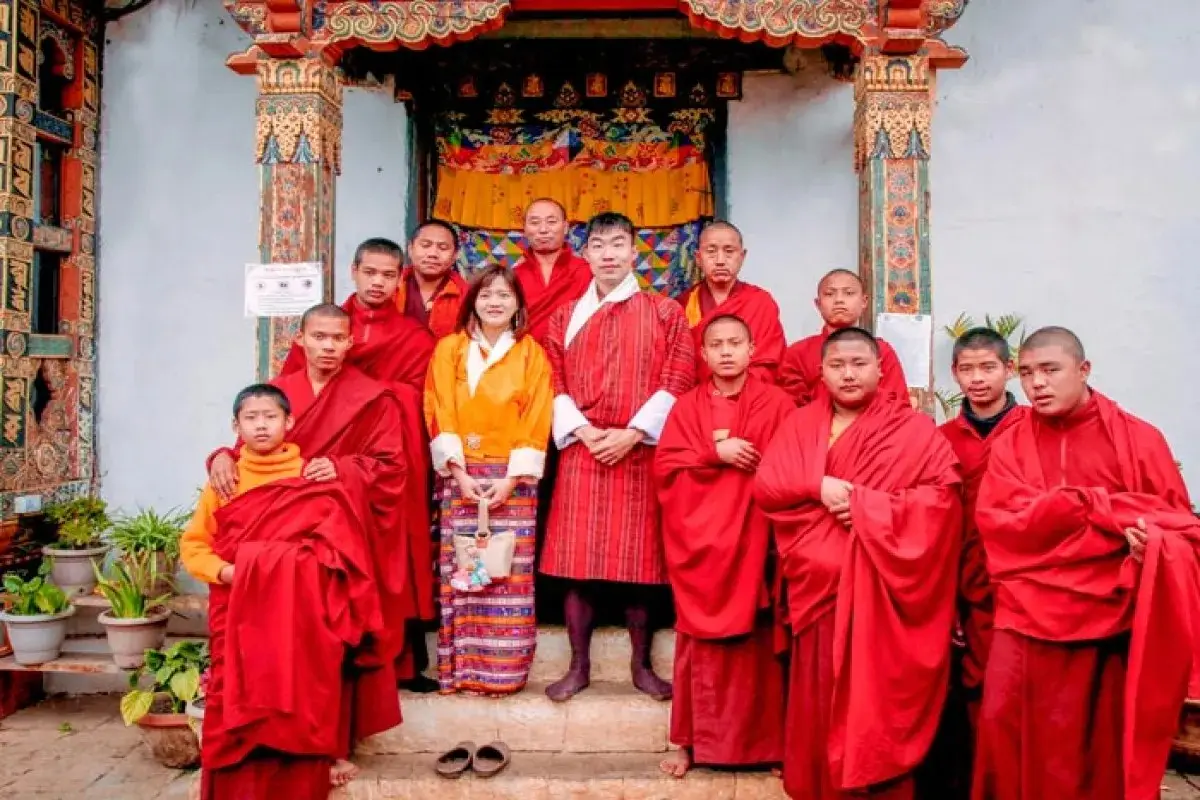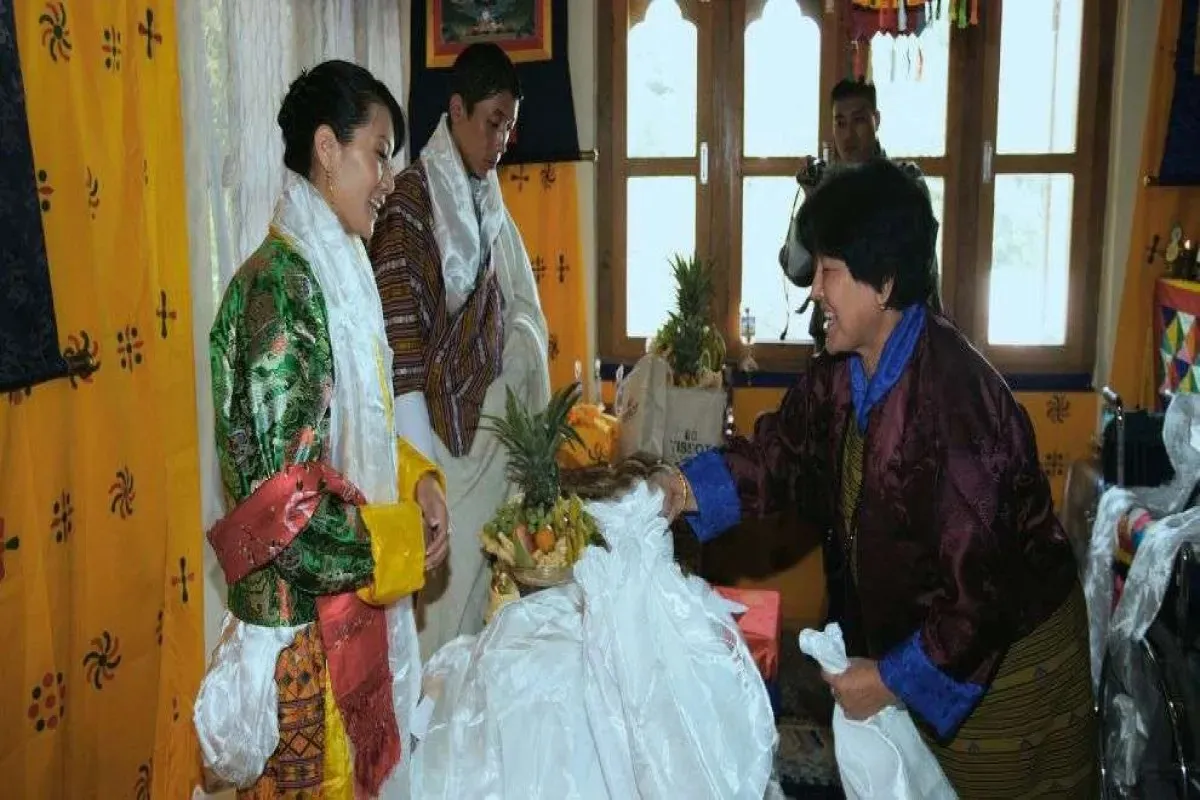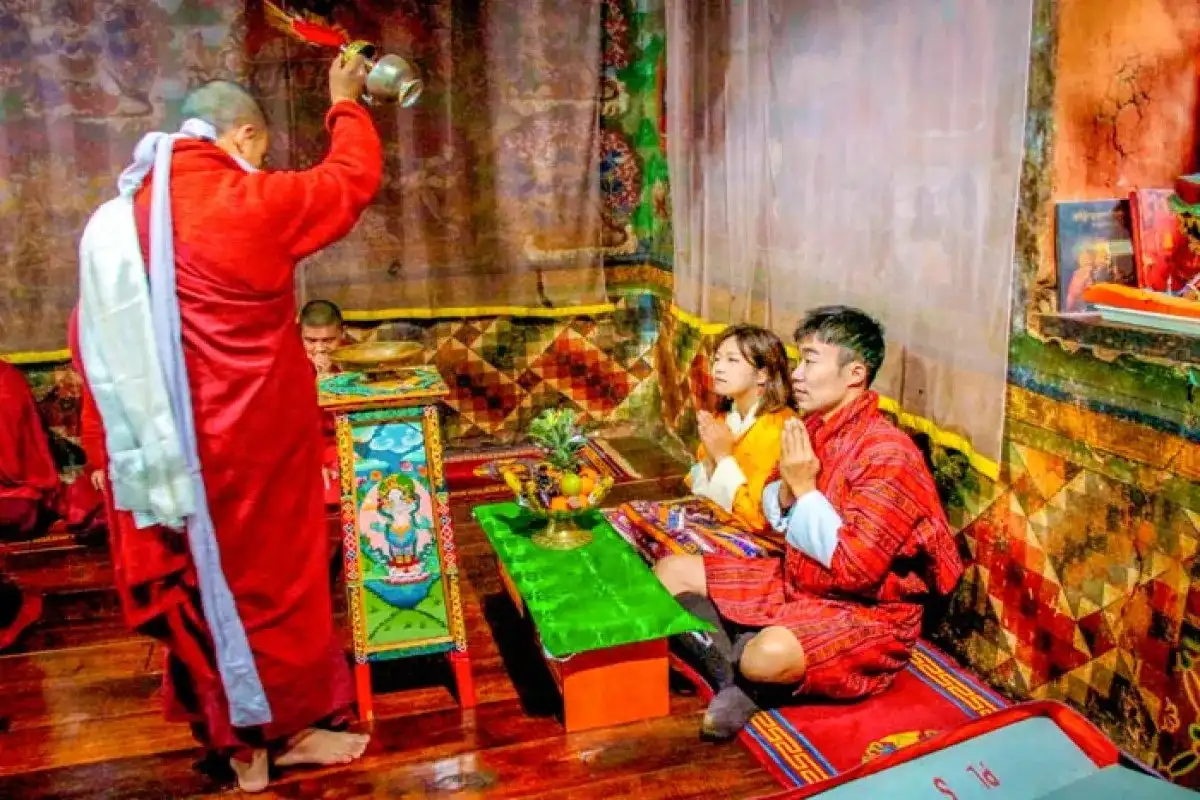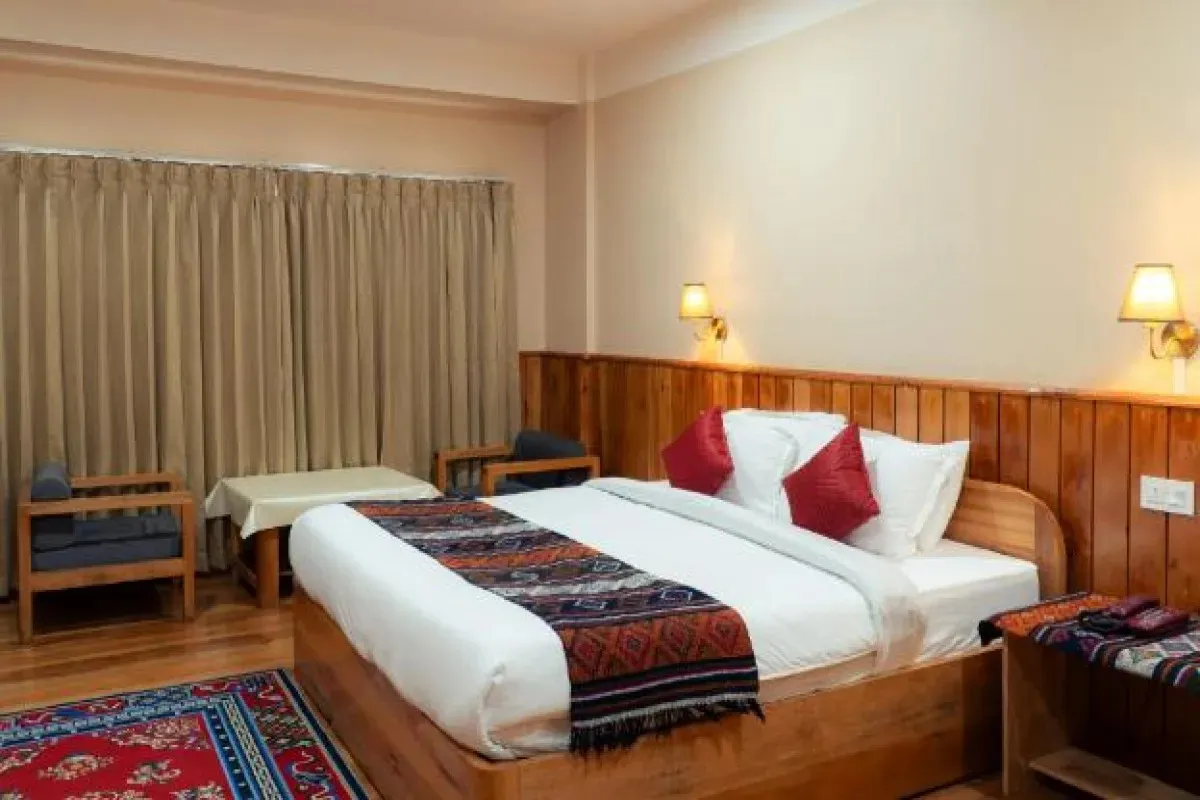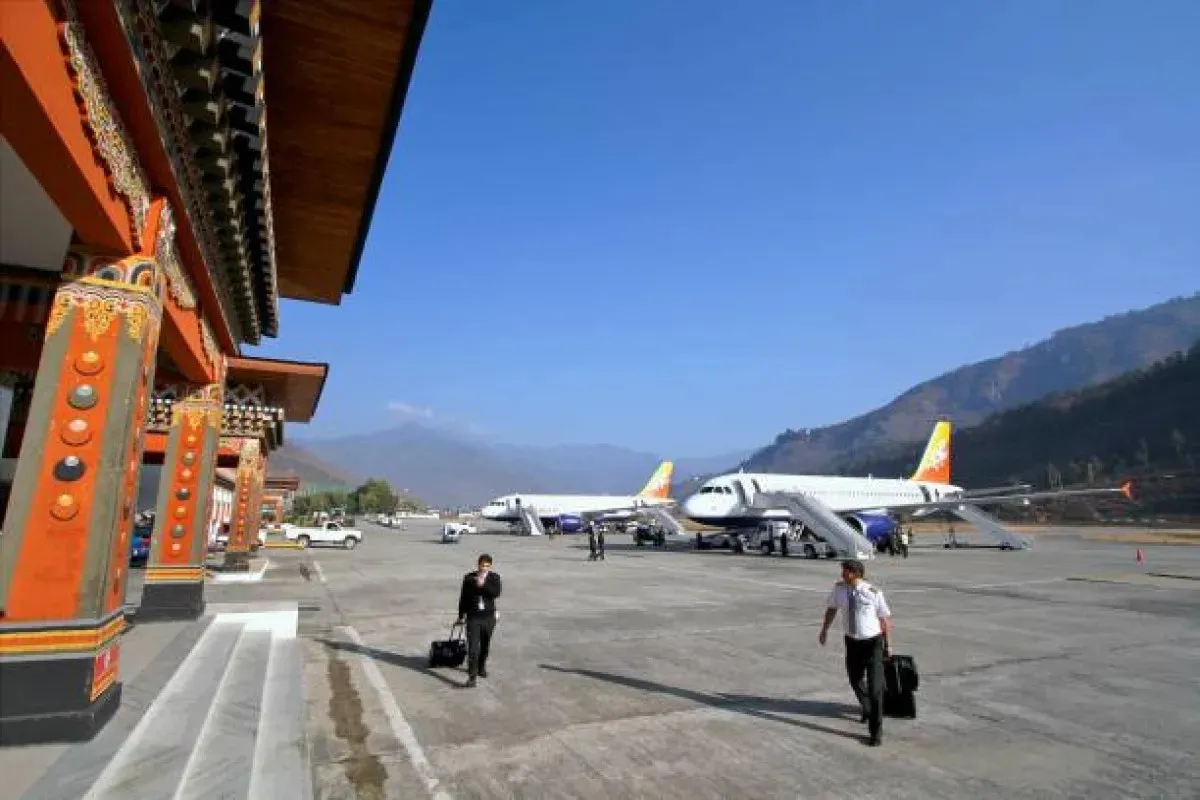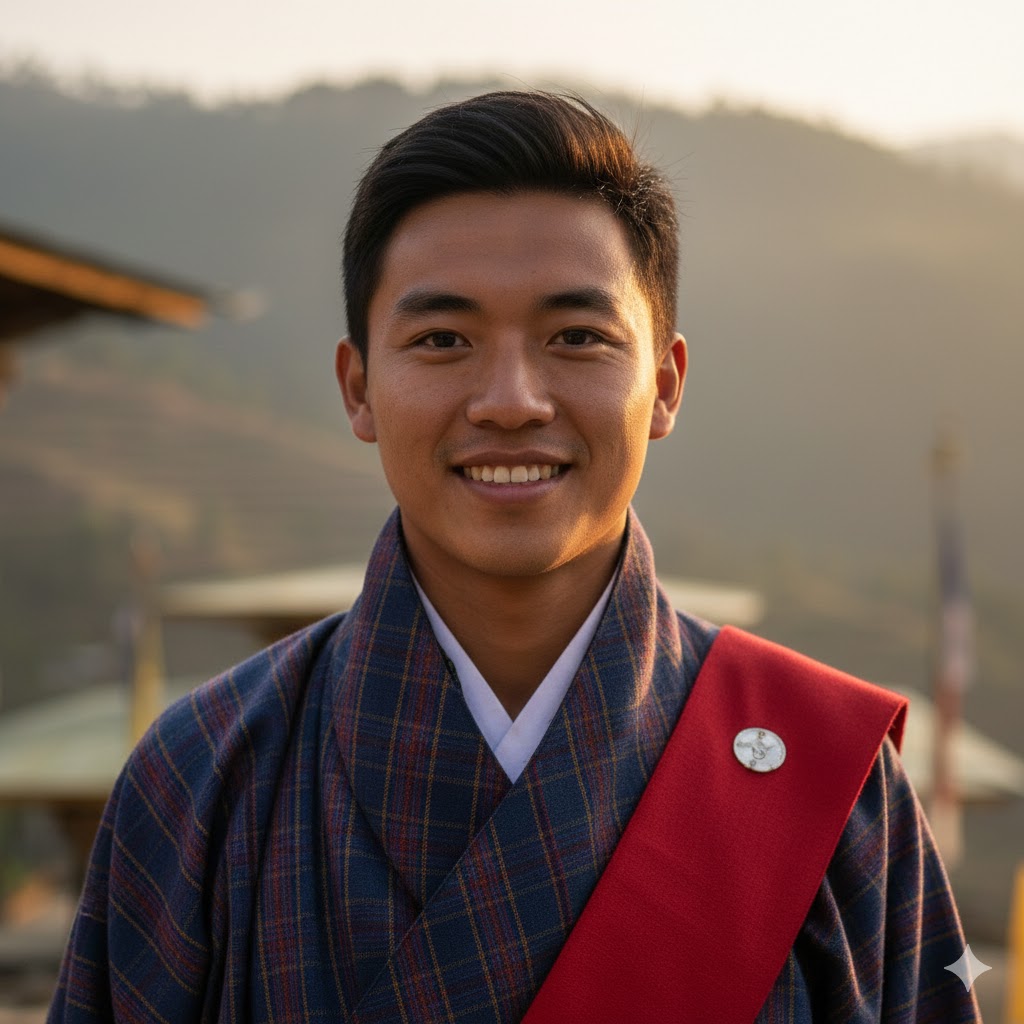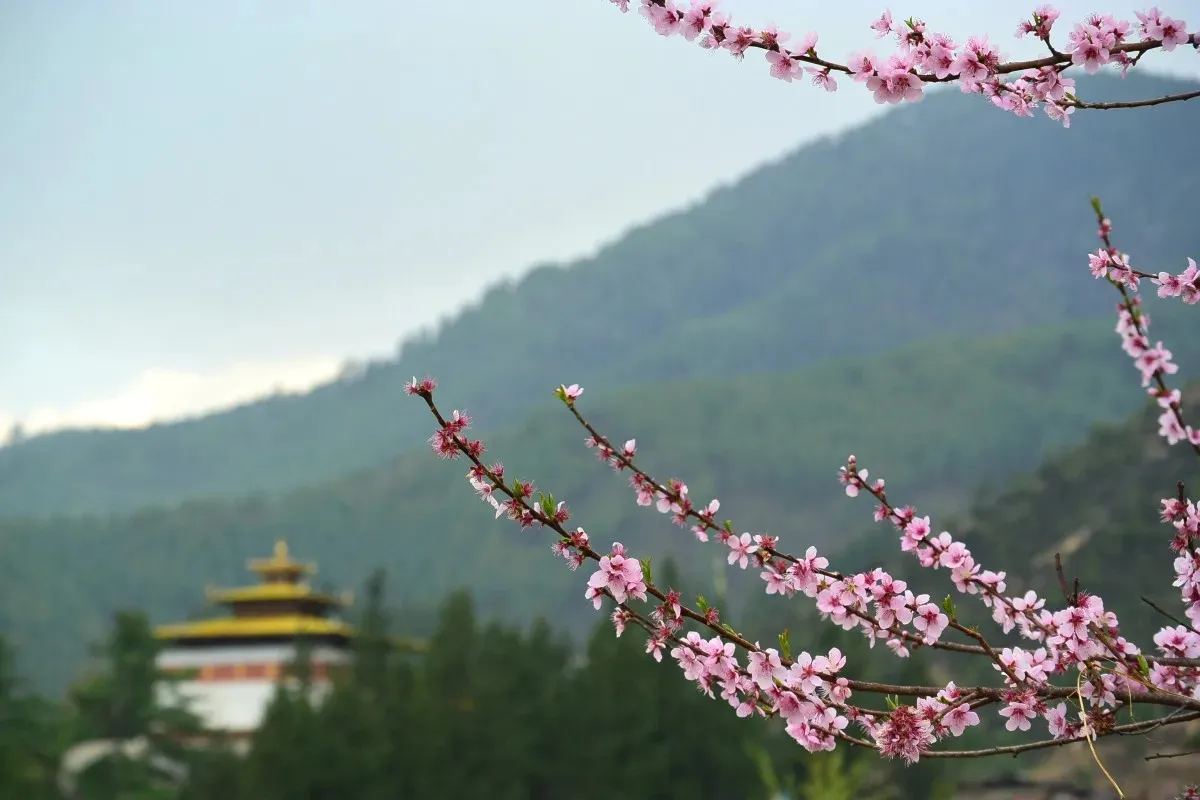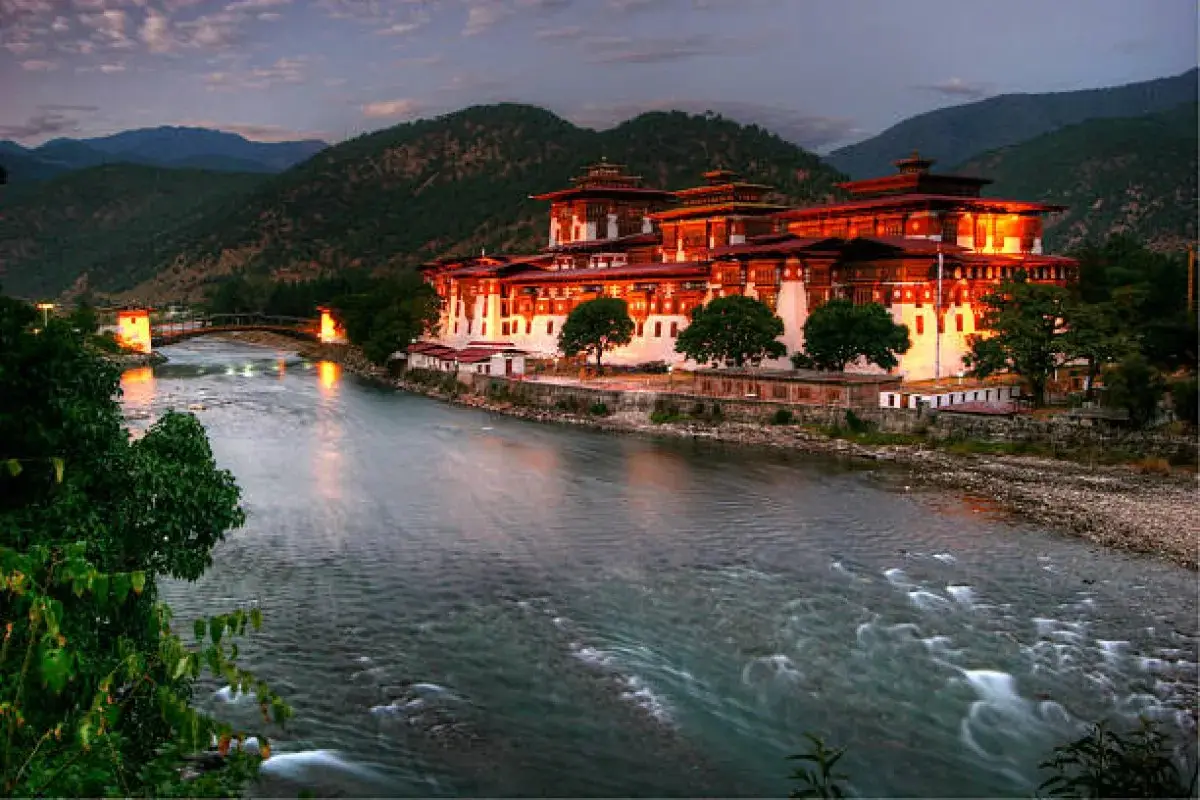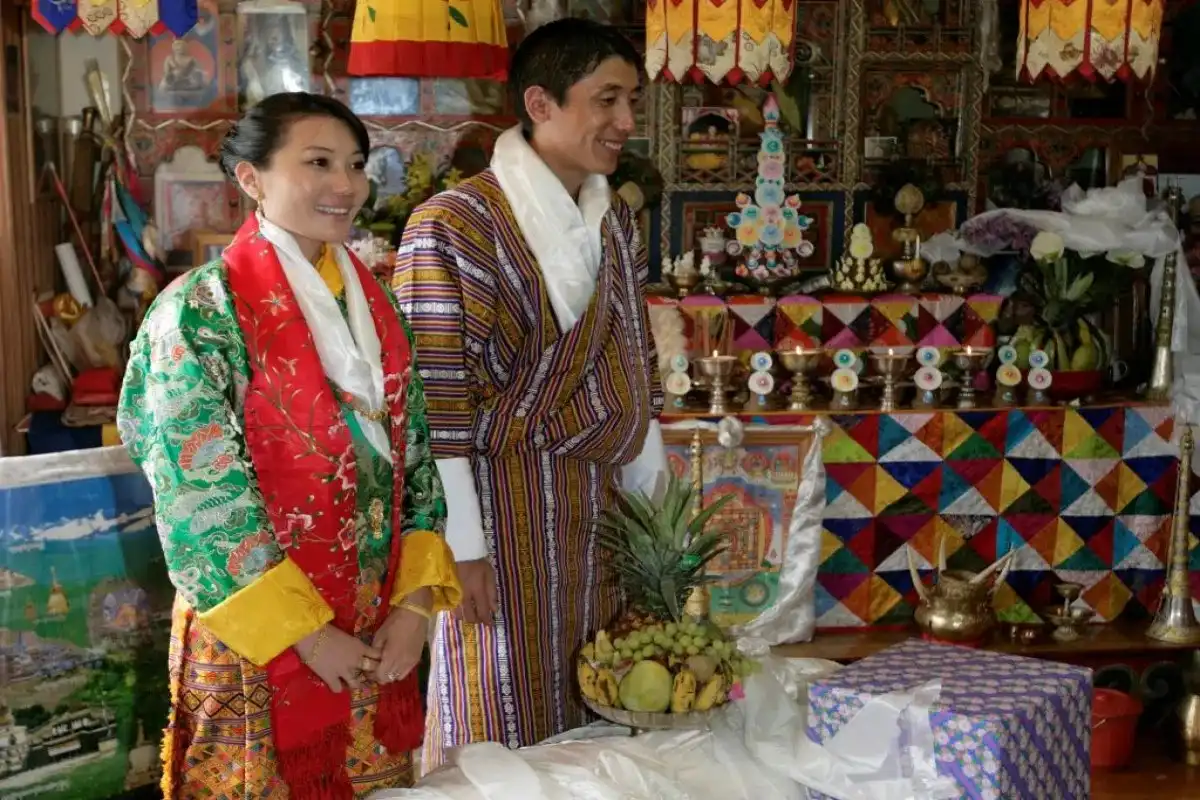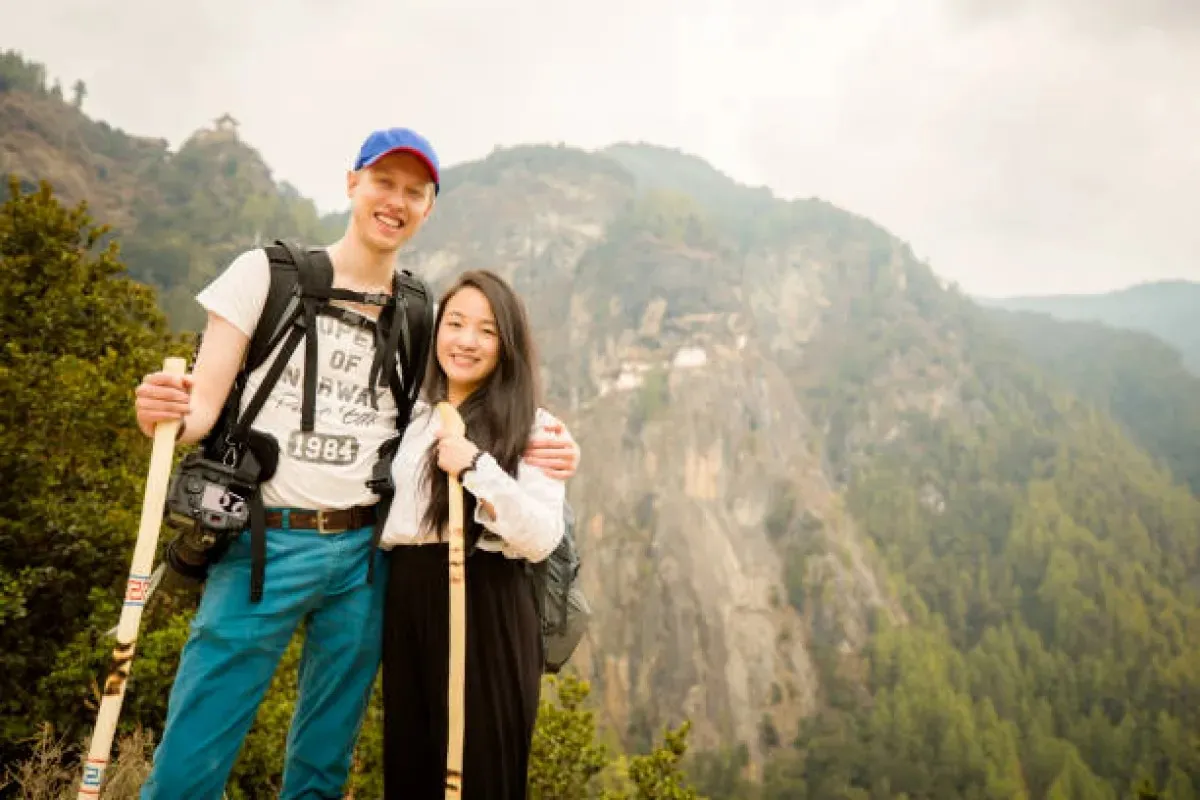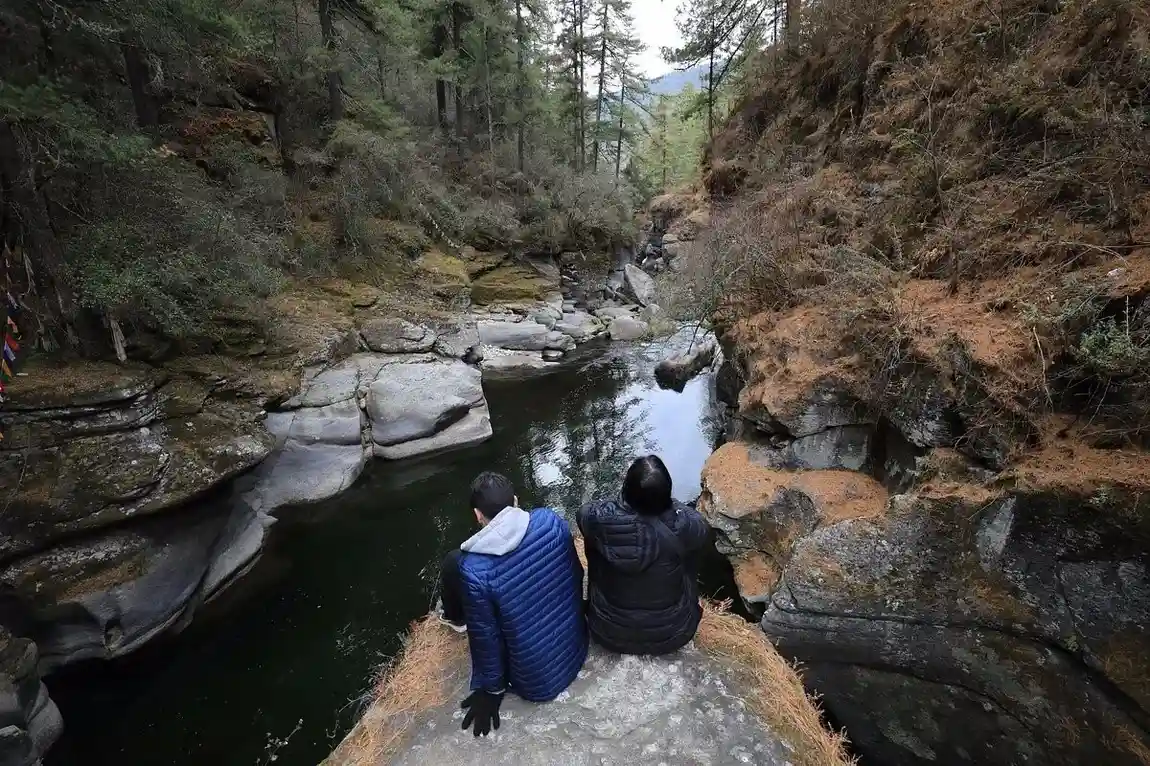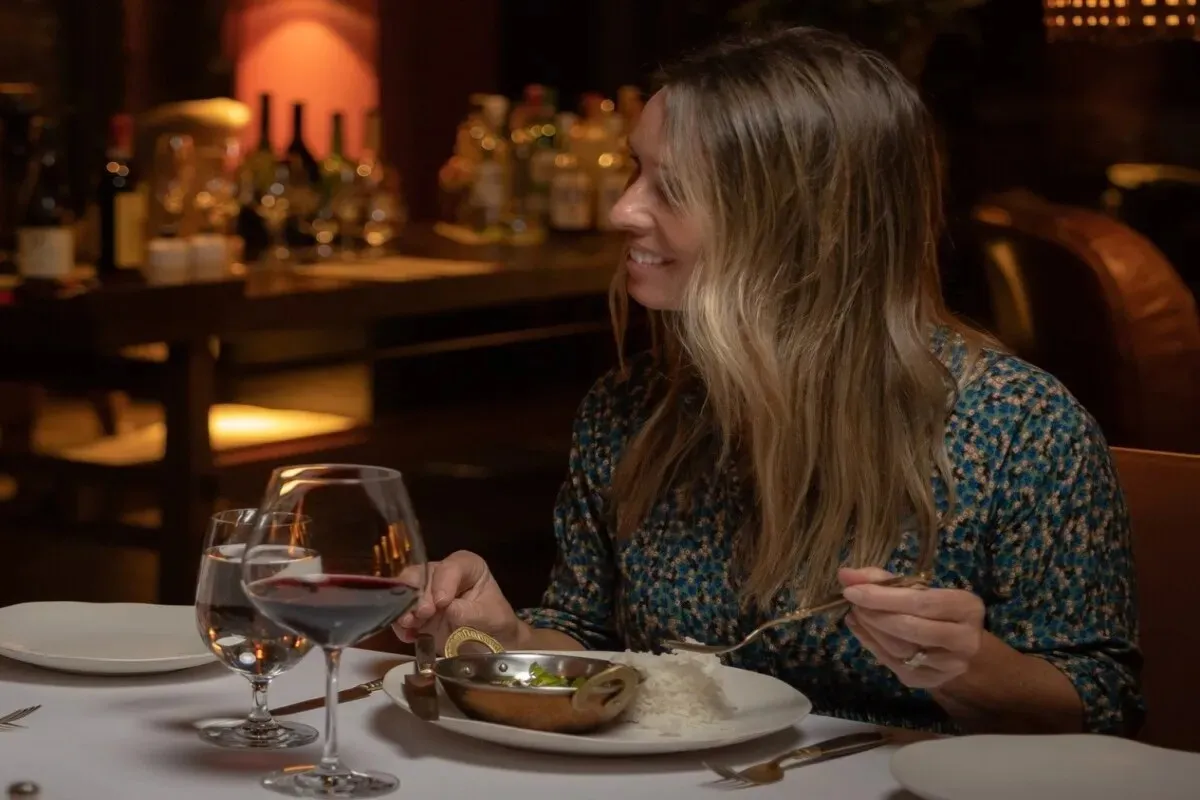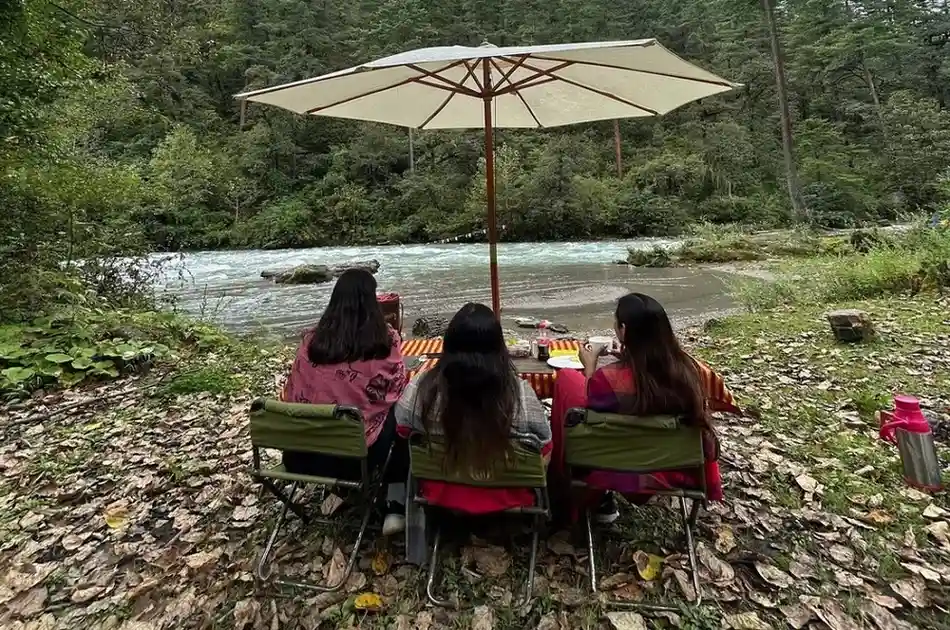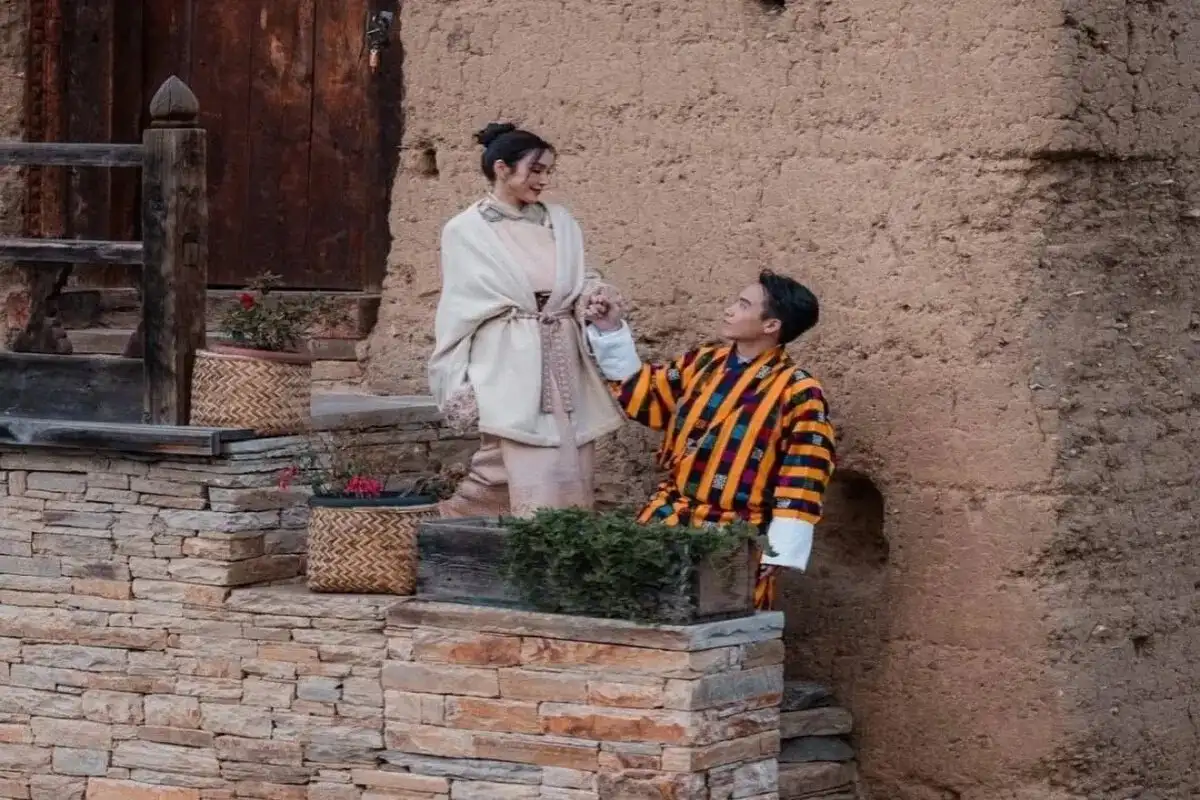Wedding Vows Renewal in Bhutan - 5 Days
Bhutan is a hidden gem located high up in the Himalayas. It is a nation full of spirituality, cultures, and nature. If you need to find an ideal place for your holiday, Bhutan is that place that combines wonderful nature, religious life, and customs, where the mix is balanced. The five-day wedding tour in Bhutan indeed promises to be an alternative option for anyone seeking an unusual experience. Within this tour, you will get to experience a different approach to celebrating weddings with lots of prayers, blessings, and rituals.
Highlights
- Re-establish the connection with your partner by doing the Thrisor Purification Ritual.
- Experience the traditional Bhutanese way of seeking blessings
- Insights on the Bhutanese wedding ceremony
- Experiencing traditions along with Bhutanese attire and cuisine
- Be a part of Bhutanese hospitality through Ara sharing and Dhar Nyanga
Trip Overview
Bhutan is a peaceful and mysterious country, especially known for its very rich spiritual culture, the amazing natural beauty, and the deep traditional roots it possesses.
Bhutan wedding tour can be an opportunity to be part of something that is based on deep-rooted religion and the values of Bhutan. You can get an opportunity to be part of something that is based on deep-rooted religion and the values of Bhutan. The trip is not only about exploring the beauty of Bhutan but also experiencing the life of Bhutan.
A wedding ceremony in Bhutan is not just a mere ritual but is an opportunity to engage in the country’s culture, religion, and nature. Wearing traditional Bhutanese wedding dresses such as gho and kira, blessings from monks, and places with the natural beauty of Druk Choeding Monastery are all part of the five-day tour package for a Bhutan wedding.
Wedding traditions in Bhutan
Unlike any weddings, Bhutanese weddings are more than an exchange of rings and vows; it is a different experience with the holy presence of monks. The wedding vows renewal starts with a blessing from monks and the head of lamas to start their journey as husband and wife.
In Bhutan, wedding ceremonies generally start early in the morning at the monastery. The bride and groom are dressed in traditional attire or in well-fitted attire to officiate their wedding vows. The monks and lamas bless the couple, and with that, the couple jointly prays to their deities for blessings. The wedding is followed by traditional music and food as a significant part of the wedding ceremony.
What can we expect in this 5-day tour?
Bhutan is a fairyland for making unforgettable experiences, getting along with the locals, and taking lessons from religious figures. The 5-day trip to Bhutan is just what you need if you are willing to not only learn about a unique wedding culture but also gain cultural or spiritual experience. Beyond that, embarking on the tour, you can take your time and enjoy the food, witness the wedding customs of Bhutan, and meet people.
Highlights of Wedding Vows Renewal in Bhutan
Get ready for the wedding vows renewal in Bhutan. You will get to enjoy the Bhutanese wedding culture along with other cultures related with the marriage ceremony. Some highlights of the wedding vow renewal in Bhutan are mentioned below :
1. Re-establish the connection with your partner by doing the Thrisor Purification Ritual.
Thrisor Purification Ritual is one of the traditional Bhutanese wedding customs that can be traced to ancient times. The purification ritual is conducted by lamas. With this rite, you and your partner will be the ones to take part in cleansing and getting rid of bond negativities. The gesture has the effect of cutting off the obstacles from the past before you start the next chapter of your life as a married couple.
2. Experience the traditional Bhutanese way of seeking blessings
In Bhutan, couples seek blessings from deities before they start their journey as husband and wife. To seek blessings, couples light a butter lamp in monasteries. Similarly, they offer food to deities to seek blessings for the new life ahead. This ritual is also called Zhugdrey Phunsum Tshogpa.
3. Insights on the Bhutanese wedding ceremony
A Bhutanese wedding is nothing like a typical Western wedding. It concentrates more on the customs and rites. In Bhutan, a wedding is not just about the bride and groom, but also about the welcoming of a new life with Monks, Lamas, and family. The Bhutanese wedding, with such traditional factors as attire and Khadas, is the embodiment of the culture of Bhutan that was set into this land in times immemorial.
4. Experiencing traditions along with Bhutanese attire and cuisine
The wedding trip to Bhutan is an excellent chance for you to wear traditional Bhutanese clothing and taste the local dishes. Bhutanese cuisine has evolved through the ages and is one of the ways to get to know the people. Through Bhutanese such as Ema Datski, Phaskha Paa, you get to explore the richness of Bhutan. Also, you get to experience the vivid cultures of Bhutan by trying on Gho and Kira (traditional dresses) and becoming one of the attendees at a wedding.
5. Be a part of Bhutanese hospitality through Ara sharing and Dhar Nyanga
Ara is a locally brewed alcohol made from wheat. When you visit Druk Choeding Monastery, you will be presented with an Ara to welcome you and as a gesture of goodwill. You will also have the chance to take part in Dhar Nyanga, which is a traditional ritual of Bhutan. It is a ceremony where a white scarf is given to you to show respect for you. Both the ritual and the Bhutanese hospitality and blessings for well-being. In a wedding tour to Bhutan, you will be able to experience great hospitality from the people of Bhutan, followed by these traditional acts.
Conclusion
To any couple looking for different life experiences bonded by cultural and religious significance, Bhutan is the best place to travel. Wedding vows renewal in Bhutan isn’t just a simple ceremony; it is about the unification of two people bound by blessings from monks and deities. The 5-day travel will be followed by a lot of praying, drinking, and dancing with the rich traditions of Bhutan. You will be able to acknowledge the magnitude of the wedding and the journey of life after the wedding with different ceremonies performed during the wedding vow renewal ceremony.
Bhutan is a peaceful and mysterious country, especially known for its very rich spiritual culture, the amazing natural beauty, and the deep traditional roots it possesses.
Bhutan wedding tour can be an opportunity to be part of something that is based on deep-rooted religion and the values of Bhutan. You can get an opportunity to be part of something that is based on deep-rooted religion and the values of Bhutan. The trip is not only about exploring the beauty of Bhutan but also experiencing the life of Bhutan.
A wedding ceremony in Bhutan is not just a mere ritual but is an opportunity to engage in the country’s culture, religion, and nature. Wearing traditional Bhutanese wedding dresses such as gho and kira, blessings from monks, and places with the natural beauty of Druk Choeding Monastery are all part of the five-day tour package for a Bhutan wedding.
Wedding traditions in Bhutan
Unlike any weddings, Bhutanese weddings are more than an exchange of rings and vows; it is a different experience with the holy presence of monks. The wedding vows renewal starts with a blessing from monks and the head of lamas to start their journey as husband and wife.
In Bhutan, wedding ceremonies generally start early in the morning at the monastery. The bride and groom are dressed in traditional attire or in well-fitted attire to officiate their wedding vows. The monks and lamas bless the couple, and with that, the couple jointly prays to their deities for blessings. The wedding is followed by traditional music and food as a significant part of the wedding ceremony.
What can we expect in this 5-day tour?
Bhutan is a fairyland for making unforgettable experiences, getting along with the locals, and taking lessons from religious figures. The 5-day trip to Bhutan is just what you need if you are willing to not only learn about a unique wedding culture but also gain cultural or spiritual experience. Beyond that, embarking on the tour, you can take your time and enjoy the food, witness the wedding customs of Bhutan, and meet people.
Highlights of Wedding Vows Renewal in Bhutan
Get ready for the wedding vows renewal in Bhutan. You will get to enjoy the Bhutanese wedding culture along with other cultures related with the marriage ceremony. Some highlights of the wedding vow renewal in Bhutan are mentioned below :
1. Re-establish the connection with your partner by doing the Thrisor Purification Ritual.
Thrisor Purification Ritual is one of the traditional Bhutanese wedding customs that can be traced to ancient times. The purification ritual is conducted by lamas. With this rite, you and your partner will be the ones to take part in cleansing and getting rid of bond negativities. The gesture has the effect of cutting off the obstacles from the past before you start the next chapter of your life as a married couple.
2. Experience the traditional Bhutanese way of seeking blessings
In Bhutan, couples seek blessings from deities before they start their journey as husband and wife. To seek blessings, couples light a butter lamp in monasteries. Similarly, they offer food to deities to seek blessings for the new life ahead. This ritual is also called Zhugdrey Phunsum Tshogpa.
3. Insights on the Bhutanese wedding ceremony
A Bhutanese wedding is nothing like a typical Western wedding. It concentrates more on the customs and rites. In Bhutan, a wedding is not just about the bride and groom, but also about the welcoming of a new life with Monks, Lamas, and family. The Bhutanese wedding, with such traditional factors as attire and Khadas, is the embodiment of the culture of Bhutan that was set into this land in times immemorial.
4. Experiencing traditions along with Bhutanese attire and cuisine
The wedding trip to Bhutan is an excellent chance for you to wear traditional Bhutanese clothing and taste the local dishes. Bhutanese cuisine has evolved through the ages and is one of the ways to get to know the people. Through Bhutanese such as Ema Datski, Phaskha Paa, you get to explore the richness of Bhutan. Also, you get to experience the vivid cultures of Bhutan by trying on Gho and Kira (traditional dresses) and becoming one of the attendees at a wedding.
5. Be a part of Bhutanese hospitality through Ara sharing and Dhar Nyanga
Ara is a locally brewed alcohol made from wheat. When you visit Druk Choeding Monastery, you will be presented with an Ara to welcome you and as a gesture of goodwill. You will also have the chance to take part in Dhar Nyanga, which is a traditional ritual of Bhutan. It is a ceremony where a white scarf is given to you to show respect for you. Both the ritual and the Bhutanese hospitality and blessings for well-being. In a wedding tour to Bhutan, you will be able to experience great hospitality from the people of Bhutan, followed by these traditional acts.
Conclusion
To any couple looking for different life experiences bonded by cultural and religious significance, Bhutan is the best place to travel. Wedding vows renewal in Bhutan isn’t just a simple ceremony; it is about the unification of two people bound by blessings from monks and deities. The 5-day travel will be followed by a lot of praying, drinking, and dancing with the rich traditions of Bhutan. You will be able to acknowledge the magnitude of the wedding and the journey of life after the wedding with different ceremonies performed during the wedding vow renewal ceremony.
Short Itinerary
Arrive in Paro. Visit Rinpung Dzong and Bhutan’s first national museum. Overnight at COMO Uma Paro.
Morning hike to Changphoed Dhar Nyanga. Explore Paro market and local life in the afternoon.
Begin wedding vow renewal with Thrisor Purification Ritual at Druk Choeding Monastery. Butter lamp offering and a couple’s photoshoot. Traditional dinner at the hotel.
Wedding vow renewal ceremony (Zhugdrey Phunsum Tshogpa) at the monastery. Afternoon Dhar Nyanga ritual. Evening celebration with a cultural show.
Morning hot stone bath and traditional breakfast. Final blessings, local village interaction, and departure from Paro.
Price Includes
- Pick-up and drop-off services
We provide a pick-up service from the airport to the hotel on your arrival day and from the hotel to the airport on the departure day.
- Lunch, Breakfast, and Dinner
All meals during the trek will be provided by the company. However, personal food items like coffee, tea, cold drinks, etc, are not included in the package.
- A guide proficient in English
A certified, English-speaking guide will accompany you throughout the trip. The guide will offer information about the trail, culture, nature, and history, and ensure your safety and a smooth experience.
- Comfortable SUV vehicle
A private SUV will be used for road travel before or after the trek. These vehicles are ideal for Bhutan’s hilly terrain and provide a comfortable ride.
- All types of entry costs
This covers all permit fees, monument entrance fees, park fees, and any other official charges required for trekking or sightseeing activities during the tour.
- Professional Drive
We ensure a safe and smooth drive during your tour. We have licensed and experienced drivers for that.
- Sleeping bag and tent
Quality sleeping bags and tents are provided for your comfort and warmth during the camping nights on the trek. So, you don’t have to worry about buying a new one.
- Farewell dinner
A special farewell meal, typically arranged in a traditional restaurant, is offered at the end of the tour to celebrate the journey and thank the participants.
- Evening Tea/coffee with snacks
Each evening, you’ll be served tea or coffee along with light snacks like biscuits and popcorn.
- Drinking Water
Safe and clean drinking water is provided throughout the trek.
- Pick-up and drop-off services
We provide a pick-up service from the airport to the hotel on your arrival day and from the hotel to the airport on the departure day.
- Lunch, Breakfast, and Dinner
All meals during the trek will be provided by the company. However, personal food items like coffee, tea, cold drinks, etc, are not included in the package.
- A guide proficient in English
A certified, English-speaking guide will accompany you throughout the trip. The guide will offer information about the trail, culture, nature, and history, and ensure your safety and a smooth experience.
- Comfortable SUV vehicle
A private SUV will be used for road travel before or after the trek. These vehicles are ideal for Bhutan’s hilly terrain and provide a comfortable ride.
- All types of entry costs
This covers all permit fees, monument entrance fees, park fees, and any other official charges required for trekking or sightseeing activities during the tour.
- Professional Drive
We ensure a safe and smooth drive during your tour. We have licensed and experienced drivers for that.
- Sleeping bag and tent
Quality sleeping bags and tents are provided for your comfort and warmth during the camping nights on the trek. So, you don’t have to worry about buying a new one.
- Farewell dinner
A special farewell meal, typically arranged in a traditional restaurant, is offered at the end of the tour to celebrate the journey and thank the participants.
- Evening Tea/coffee with snacks
Each evening, you’ll be served tea or coffee along with light snacks like biscuits and popcorn.
- Drinking Water
Safe and clean drinking water is provided throughout the trek.
Price Excludes
- International Airfare
- Visa Charges and Insurance
- Individual expenditures
- Additional-day lodging
- Laundry and telephone expenses
- Tips for the guide and the porter
- International Airfare
- Visa Charges and Insurance
- Individual expenditures
- Additional-day lodging
- Laundry and telephone expenses
- Tips for the guide and the porter
Wedding Vows Renewal in Bhutan Itinerary
You will reach Paro International Airport on the first day. From the airport, a guide will be there to collect your baggage. After this, you will be checking in at your hotel, COMO Uma Paro. Then you can rest or have lunch.
Following this, you will be heading to Rinpung Dzong. Rinpung dzong is known for its amazing architecture. There, you can take your time to explore the 17th-century architecture alongside artworks. After this, you will head toward Bhutan’s first national museum and get a closer look at Bhutan’s tradition and history. This way, you would complete your first day in Bhutan.
Distance from Paro to Rinpung Dzong (3 kilometers)
You will start your day early in the morning, followed by a healthy breakfast. Then you will be heading to Changphoed Dhar Nyanga, a fascinating hilltop locality. It will be a short hike to Changphoed Dhar Nyang from Paro. You can enjoy the overview of Paro valley, surrounded by mountains and hills, from the top of Changphoed Dhar Nyang. After this, you will go down to Paro valley.
A walk on the streets of Paro Valley on the first day of your trip is an excellent way of relaxing and also of viewing the Paro market. By this, you are able to come face to face with the ordinary life of Bhutanese people, and also get a chance to shop for souvenirs to take back to your hometown.
On day 3 you can start the day with an early morning couples spa provided by the hotel to start the day. After the spa, you will be guided to Druk Choeding Monastery for the Thrisor Purification Ritual. The ritual is performed right before the wedding to purify the bond between the couple. You will have the option to wear a gho and a kira for this ceremony. The ceremony will be conducted by monks present in the monastery.
Following the Thrisor ritual, you will light butter lamps. This is done to seek blessings from deities. After the ceremony, you will have a couple of photo shoot sessions at Druk Choeding Monastery. In Choeding, you will be welcomed with the Bhutanese alcoholic drink Ara. It is a home-brewed drink shared with visitors. It is offered as a sign of goodwill.
In the evening, you can enjoy a traditional Bhutanese dinner at the hotel.
distance from Paro to Druk Choeding Monastery ( 19 kilometers)
On day 4, you will dress in traditional attire, gho and kira, early in the morning. Then you will proceed with the Zhugdrey Phunsum Tshogpa ceremony at Druk Choeding Monastery. The ceremony will start with blessings from monks present in the monastery. Then, you will offer food to the gods and deities to seek blessings for everlasting happiness in your new life. This is a traditional ritual also known as Zhugdrey Phunsum Tshogpa.
In the afternoon Dhar Nyanga ceremony will take place, where white scarves are presented to the bride and groom by families and guests. In the evening, all the guests and families will head to a hotel where a private celebration will take place with food, music, and cultural performances.
You will start the morning with a hot stone bath in the hotel. It will help you relax your body and then proceed with traditional foods made from fresh local ingredients. After this, you can seek final blessings from monks with khadas.
With this, you will also be able to get to know how people live in the village of Paro and even interact with them, something that will make it possible to acquire a new experience and shop for the beautiful mementos that are there. Then, you will check out of the hotel and head to the airport. As you depart from Bhutan, you will take away a new connection and many memories.
Know Before You Travel
-
With the trip to Bhutan for wedding vows renewal,:
Any couple will feel a sense of unity and purity by indulging themselves in religious practices. Couples who are open to experiencing a new spiritual beginning will find Bhutan the best destination to transition their relationship. With the traditions symbolizing unity, purification, love, respect, and harmony, unmarried and married couples move to new paths in life together, bonded by the cultures of Bhutan. With the blessings that couples who partake in a 5-day wedding renewal they are establishing hope for long-term prosperity and commitment in their relationship.
map-wedding-vows-renewal-in-bhutan
Download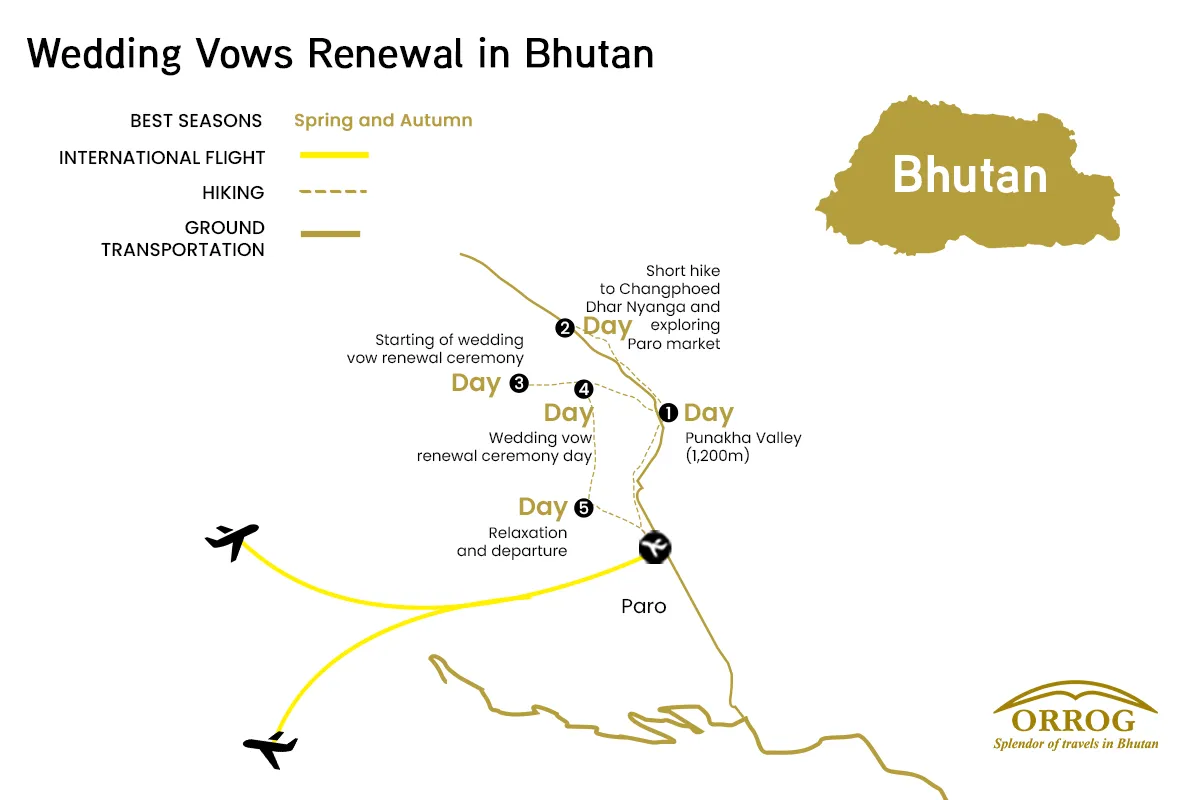
Wedding traditions in Bhutan
FAQs for Wedding Vows Renewal in Bhutan
There is no criterion for couples to follow for a wedding vow renewal tour. Unmarried couples and couples seeking a cultural and spiritual experience can visit Bhutan for wedding vow renewal.
Yes, anyone seeking to experience different wedding ceremonies and cultural significance can forgo the Bhutanese wedding ceremony.
There are 2 best seasons to visit Bhutan for tourists, one from March to May and another from September to November. Tourists wanting to renew their vows can visit between these two seasons.
In Bhutan, marriage vow renewal is a symbolic and spiritual event. It is a way to express their feelings about the wedding and is not a legal marriage contract.
Yes. You can include personal vows, music, specific rituals, and even a private dinner or cultural show for guests.
No, there are no rigid regulations for couples, but it is couples must be culturally aware and follow the traditions of Bhutan.
We suggest that you book not sooner than 3 or later than 6 months in advance if you want to have the dates and conditions of the trip the way you want them.
Yes, you can wear Bhutanese traditional attire for a wedding vow renewal ceremony. The groom can wear a Gho, and the bride can wear a Kira. Also, the guest can wear Bhutanese attire. You can also easily rent the attire.
The national language is Dzongkha, but many Bhutanese also speak English.
Yes, all licensed guides are fluent in English and sometimes other languages as well.
Most signs and maps intended for tourists are written in English.
It's not necessary, but learning a few basic phrases is appreciated by locals.
Your guide will handle communication, so language barriers are minimal.
The national language is Dzongkha, but many Bhutanese also speak English. If you speak English and are worried about communicating with the local people, you will have your guide as a translator.
Yes, all licensed tour guides in Bhutan are required to speak fluent English. Many are also trained in other languages such as German, Japanese, or French. Communication during the trip will be smooth and clear in English.
Most signboards, tourist maps, and information brochures are written in English, especially in tourist destinations like Paro, Thimphu, and trailheads. Directional signs along routes are often labeled in both Dzongkha and English.
No, learning Dzongkha is not at all needed for the trip, but knowing a few basic words like "Kuzu zangpo la" (Hello) or "Kadrinche la" (Thank you) is a good way to interact with the locals.
Language barriers are minimal, as your guide will handle all communication with locals and support staff. Your guide will translate for you during your interaction with the locals.
You need a visa and all necessary permits for your trip. These documents can not be received on the day of your arrival, so they must be processed before coming here. After you book a trip with us, we will manage these papers for you. Your Bhutan visa is arranged by Orrog as part of the package.
The main way to come to Bhutan is through Paro International Airport, which is well-connected to cities like Bangkok, Delhi, Kathmandu, and Singapore. Most people arrive by air, but if you plan to come via road, you can enter through Phuentsholing, located on the southern border with India, which is the most commonly used entry point.
It is recommended to apply for the visa at least 20 days before your planned departure date so that there is enough time for processing your Bhutan visa, finalizing your itinerary, and arranging your guides and transportation. Although visa processing itself is relatively fast once payment is received, early preparation helps avoid delays and ensures availability, especially during peak seasons (spring and autumn).
You don’t require a passport-size photo for the visa, but it is wise to carry at least 2–4 recent passport-sized photographs during your trip. These may be needed for local permits, registration, or when applying for a local SIM card upon arrival in Bhutan.
Yes, you can lengthen your stay in Bhutan either before or after your trip. Bhutan’s tourism model requires visitors to pay a Sustainable Development Fee (SDF) and a daily package cost, so any extra days will involve additional charges. Extensions are a great opportunity to explore cultural sites in Paro, Thimphu, or even add another short trip or day hike.
Yes, Bhutan requires full tour payment in advance before your visa can be processed and issued. The government of Bhutan regulates this policy to ensure that all travel arrangements are confirmed through a licensed Bhutanese tour operator. We are a licensed tour operator that ensures you have everything you need for a trouble-free trip.
Any personal expenses are not covered in the package like:
- Tips for your guide and other staff
- Bottled drinks and snacks(personal expense)
- Souvenirs or local crafts
Credit cards are easily accepted in major cities like Paro and Thimphu. But in remote areas, you may not have access to a card or an ATM. So, it is best to carry some cash before heading for the trip.
Tipping is not mandatory, but it is a widely appreciated gesture and a customary way to show gratitude for good service. The tipping guideline would be to give USD 5-10 per day as a tip for the guides and other staff.
Paro International Airport is the only international airport in Bhutan. It is well connected by flights from cities like Bangkok, Delhi, Kathmandu, and Singapore.
Yes, airport pick-up and drop-off are included in the package. We will have your guide and driver meet you at the airport and transport you to your hotel.
While Bhutan's roads are mostly paved, some parts are narrow, winding, and occasionally affected by weather. However, we ensure your travel is safe, well-maintained, and driven by an experienced professional throughout the journey.
The Bhutanese Ngultrum is used in Bhutan. All local transactions during the trip will be in BTN.
US Dollars (USD) are generally accepted at larger hotels, souvenir shops, and tour operators, particularly in Paro and Thimphu. However, it’s advisable to convert your currency to BTN for general purchases in rural areas. Other currencies like the Euro or the Pound are not commonly accepted directly.
No, credit or debit cards are not accepted on the trip, as it takes you through remote regions with no banking or electronic payment access. All trip-related payments like accommodation, meals, permits, etc, are paid in advance.
You can exchange foreign currency at the Paro International Airport, at banks, or through licensed money changers in cities like Thimphu and Paro. It's best to exchange enough cash before heading out on the trip.
To greet people, you can greet with locals “Kuzu zangpo la” (Hello) by performing a slight bow. Most common greetings include physical greetings, such as shaking hands less visible, especially in rural areas.
Yes, but remember to seek permission, especially when taking photos of monks, locals, or temples. Please note that clicking photos is not allowed at most religious sites.
Visitors should dress modestly and respectfully. This means:
- Covering shoulders and knees
- Removing hats and sunglasses
- Not wearing shorts or sleeveless tops
This applies to both men and women.
Yes, Bhutanese society is deeply rooted in Buddhism and tradition. Here are some key taboos:
- Do not point your feet at people or sacred objects
- Never touch anyone on the head, as it is considered sacred
- Walk clockwise around temples, stupas, and religious monuments
- Avoid public displays of affection
While gifts are not expected, they may be accepted graciously if given with respect. It is advisable to consult with the guide before giving out anything.
Bhutan typically uses Type C, Type D, and Type G electrical outlets. Standard safe voltage is 230V and frequency is 50Hz; therefore, ensure that your equipment is compatible with this voltage.
Indeed, it is highly advised to take along a universal travel adapter, particularly one to fit a variety of types of plugs, because plugs can be different in a hotel or a guesthouse.
Bhutan follows Bhutan Time (BTT), which is UTC/GMT +6 hours. This time zone remains consistent throughout the year.
No, Bhutan does not observe daylight saving time. The country maintains the same time year-round.
Bhutan is 30 minutes ahead of India. For example, 12:00 PM in India is 12:30 PM in Bhutan.
Yes, souvenirs can be bought in Paro or Thimphu before or after the trip.
Some popular souvenirs include hand-woven textiles (kira and gho fabric), prayer flags, thangka (religious scroll) paintings, handmade paper products, traditional masks, and Buddhist artifacts.
You can do some gentle bargaining in local street markets. However, in government-run shops and fixed-price stores, prices are usually non-negotiable.
Yes, you can easily purchase a SIM card upon arrival in Bhutan. We will assist you with the process, and you'll need a passport copy and a passport-sized photo.
No, internet access is not available during the trip. However, Wi-Fi is available in hotels in Paro and Thimphu before and after the trip.
Our Honeymoon package includes handpicked 3 to 5-star hotels, boutique resorts, or heritage lodges offering romantic settings and personalized service. If you have any special requests, we will add them to your itinerary.
Yes, rooms can be decorated with flowers, candles, and other romantic touches according to your request. Honeymoon suites or luxury upgrades are also available.
Romantic walks in nature, traditional hot stone baths, couple spa treatments, monastery blessings, riverside picnics, and cultural dress photoshoots can be included.
Yes, we can arrange a wedding blessing by monks in a monastery, which is believed to be auspicious.
Yes, couples can enjoy light hikes, cycling, archery, and even short treks like the Taktsang (Tiger’s Nest) hike together.
Yes, romantic candlelight dinners, rooftop or riverside dining, and private meals at scenic locations can be arranged to meet your needs.
Yes, vegetarian, vegan, and other dietary preferences are accommodated with prior notice.
Spring (March–May) and autumn (September–November) offer the best weather, blooming flowers, and clear skies perfect for romance and photography.
Winter (Dec–Feb) is chilly but offers fewer tourists, snow-capped views, and cozy indoor experiences for couples who love winter vibes.
Bring layered clothing, comfortable shoes for walking, a light jacket, formal outfits for romantic dinners, and swimwear if your hotel has spa or hot bath facilities.
Yes! We can arrange Gho and Kira (national dress) for couple photoshoots.
Reviews & Ratings
-
Guarantee -
Thimphu,Bhutan -
975+17160228
Ready to Explore Bhutan?
Start your journey today and discover the magic of Bhutan with our expert guides and carefully crafted tours.
Book This Trip
-
No booking or credit card fees -
Best price guarantee -
Full customize trip
Ask a Question
Feel free to ask us anything about this tour. A travel expert will then get back to you as soon as possible
Ready to Explore Bhutan?
Start your journey today and discover the magic of Bhutan with our expert guides and carefully crafted tours.
